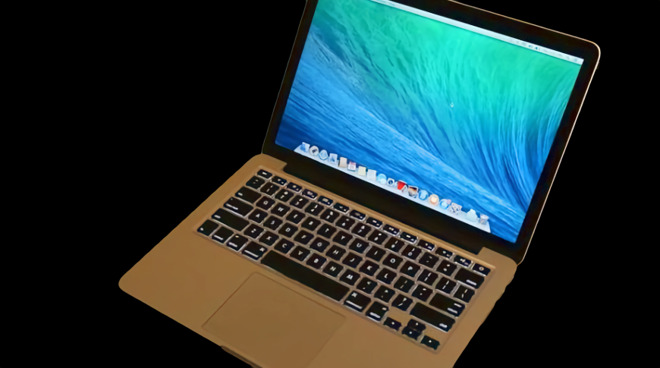Apple's macOS Big Sur may be bricking older MacBook Pro models
New reports claim that some late 2013 and mid 2014 13-inch MacBook Pro owners are unable to use their machines after upgrading to macOS Big Sur

Apple's late 2013 13-inch MacBook Pro
Some users are reportedly finding that upgrading to macOS Big Sur renders their Macs unworkable. It appears to be specifically the 13-inch MacBook Pro that is affected, and then chiefly the late 2013 and mid 2014 models.
During the upgrade to macOS Big Sur, these machines reportedly get stuck and remain permanently on a black screen. Typical Mac restart solutions, such as using Internet Recovery, or booting up in Safe Mode, do not work or are simply unavailable.
Apple has not yet commented publicly, though one user on the company's support forums said that the issue was being escalated to the engineering teams.
This problem is being reported by multiple users on Apple's support forums, plus more on Reddit. It was originally spotted by MacRumors.
The late 2013 MacBook Pro is among the oldest machines that macOS Big Sur is be compatible with. AppleInsider has not been able to duplicate the reported problem.

Apple's late 2013 13-inch MacBook Pro
Some users are reportedly finding that upgrading to macOS Big Sur renders their Macs unworkable. It appears to be specifically the 13-inch MacBook Pro that is affected, and then chiefly the late 2013 and mid 2014 models.
During the upgrade to macOS Big Sur, these machines reportedly get stuck and remain permanently on a black screen. Typical Mac restart solutions, such as using Internet Recovery, or booting up in Safe Mode, do not work or are simply unavailable.
Apple has not yet commented publicly, though one user on the company's support forums said that the issue was being escalated to the engineering teams.
This problem is being reported by multiple users on Apple's support forums, plus more on Reddit. It was originally spotted by MacRumors.
The late 2013 MacBook Pro is among the oldest machines that macOS Big Sur is be compatible with. AppleInsider has not been able to duplicate the reported problem.

Comments
TimA
It used to be the case you could put a CD in with the EFI (firmware) on, and the Mac would boot from it and self-recover. Obviously that is no longer an option for most people, so newer Macs are supposed to self-recover. But presumably that is what's broken. Let's hope Apple does the Right Thing here and fixes those Macs where the update failed without charge, since it's not the customer's fault whatsoever. I suspect the broken Macs still have the ability to boot silently to an EFI image over USB, so Apple may push a fix that can be installed to a USB memory stick. Of course if Apple didn't obscure the update process under a black screen people would have a better idea of what's going on when it fails.
It likely makes sense given only professional beta testers would keep around old machines in some "never been updated" condition to test the process. People whose old machine is their primary machine are simply not going to be a beta tester.
These experiences should make us appreciate the work that goes into the space program, which often launches with old technologies because there is in practice no ability to thoroughly test everything unless they're given a decade or more.
On my Late 2014 Mac Mini HDD-only machine that I converted to Fusion using a third party M.2 NVMe adapter card and 512 GB SSD, I skipped the betas entirely because I was somewhat concerned about the non-standard setup causing a problem. My concerns turned out to be unnecessary, at least after waiting a couple of days for the initial Big Sur kerfuffle to dissipate. No problems with this machine since its conversion to Fusion. I'm still amazed that a sub $20 board and a $100 SSD turned what was a tortuous machine to use into one that is a pleasure to use and very stable.
I'm with Elijahg in thinking that the black screen issues that some people are seeing may be due to firmware updates being slipstreamed into the Big Sur installation. I also know from personal experience that macOS upgrades change the designated boot disk on the fly and ignore the settings you've established in the OS or via the previous Option key boot selection. That's the reason I abandoned the workaround of booting my HDD Mac Mini from an external SSD and went the internal Fusion/SSD direction. It made upgrades a royal PIA. I've also had cases where my Late 2012 iMac would try to boot from a TB attached Time Machine backup drive during upgrades or after invoking PRAM resets. For a while I'd always unplug all external drives before starting any OS upgrades, but with Catalina that problem seems to have been resolved, but I remain wary.
Big Sur is a much bigger upgrade than we think. It's far more involved than just prettier icons. They made a lot of changes under the hood, especially to bolster security, and to accommodate M1. It's macOS 11 for a reason.
Since the update I'm plagued by the usual iCloud photos related processes (especially com.apple.photos.VideoConversionService) taxing the system and running up the fan. I had the same issue for several weeks after I upgraded from Mohave to Catalina (which I did early this year). For some reason Photos seems to decide to re-do its library every time there is a major OS update.
Now, if only I was allowed to visit an Apple Service Centre...